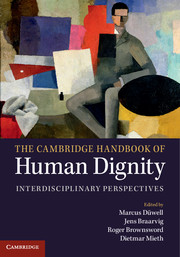Book contents
- Frontmatter
- Contents
- List of contributors
- Foreword
- Why a handbook on human dignity?
- Acknowledgments
- 1 Human dignity from a legal perspective
- 2 Human dignity: concepts, discussions, philosophical perspectives
- Part I Origins of the concept in European history
- 3 Meritocratic and civic dignity in Greco-Roman antiquity
- 4 Human dignity in the Middle Ages (twelfth to fourteenth century)
- 5 Human dignity in late-medieval spiritual and political conflicts
- 6 Human dignity in Renaissance humanism
- 7 The Council of Valladolid (1550–1551): a European disputation about the human dignity of indigenous peoples of the Americas
- 8 Martin Luther's conception of human dignity
- 9 Natural rights versus human dignity: two conflicting traditions
- 10 Rousseau and human dignity
- 11 Human dignity and socialism
- 12 Human dignity in the Jewish tradition
- Part II Beyond the scope of the European tradition
- Part III Systematic conceptualization
- Part IV Legal implementation
- Part V Conflicts and violence
- Part VI Contexts of justice
- Part VII Biology and bioethics
- Appendix 1 Further reading
- Appendix 2 Universal Declaration of Human Rights
- Index
- References
11 - Human dignity and socialism
from Part I - Origins of the concept in European history
Published online by Cambridge University Press: 05 March 2015
- Frontmatter
- Contents
- List of contributors
- Foreword
- Why a handbook on human dignity?
- Acknowledgments
- 1 Human dignity from a legal perspective
- 2 Human dignity: concepts, discussions, philosophical perspectives
- Part I Origins of the concept in European history
- 3 Meritocratic and civic dignity in Greco-Roman antiquity
- 4 Human dignity in the Middle Ages (twelfth to fourteenth century)
- 5 Human dignity in late-medieval spiritual and political conflicts
- 6 Human dignity in Renaissance humanism
- 7 The Council of Valladolid (1550–1551): a European disputation about the human dignity of indigenous peoples of the Americas
- 8 Martin Luther's conception of human dignity
- 9 Natural rights versus human dignity: two conflicting traditions
- 10 Rousseau and human dignity
- 11 Human dignity and socialism
- 12 Human dignity in the Jewish tradition
- Part II Beyond the scope of the European tradition
- Part III Systematic conceptualization
- Part IV Legal implementation
- Part V Conflicts and violence
- Part VI Contexts of justice
- Part VII Biology and bioethics
- Appendix 1 Further reading
- Appendix 2 Universal Declaration of Human Rights
- Index
- References
Summary
Conceptual clarifications: general overview
The concepts of human dignity and socialism are both extremely indefinite and should here be understood in a broad sense. I will only briefly indicate how the concept ‘human dignity’ is here used (Lohmann 2013). Historically, social conceptions of a particular dignity and honour (for example, of a position, of a class, due to special achievements) can be differentiated from conceptions of general dignity accorded to all humans (for different reasons: for example ontological position in the cosmos, capacity to reason, creation in the image of god). Since the new beginning of international law after the Second World War, universal human dignity has been tied to the possession of human rights. Human dignity as a ‘basis’ of human rights is a morally grounded norm enacted as nationally and internationally applicable law through the shaping of political will. To respect, protect and guarantee these rights are in the first instance duties of the respective state, second of all states, and by means of a ‘horizontal effect’ of all humans as well. The content of ‘human dignity’ refers to the capabilities of humans for free, reflected self-determination, to their equal legal recognition and self-recognition and to the conditions of a minimum subsistence level which allow a life worthy of human dignity (in German, menschenwürdiges Leben).
‘Socialism’ is an equally encompassing concept applicable to different conceptions of society which aspire to a social organization of the economy, of ownership structures, of society and/or of the state in criticism of capitalism and its associated individualism. Historically, the concept first appears as a category of philosophy of law (sozialismo, A. Buonafede, 1798), following Hugo Grotius and Samuel Pufendorf, in order to establish natural law on the basis of sociability against catholic views (Schnieder 1984). In England, the concept has been used only since 1837 for the designation of Robert Owen's visions of society (Cole 1962). The development of socialist movements and corresponding conceptions range from early socialism (or, in Engels’ terms, ‘utopian socialism’, 1789–1848) in France, Marx’ scientific socialism and numerous variations (anarchistic socialism, state socialism, reform socialism, market socialism, democratic socialism etc.), the creation of labour unions and socialist, communist or social democrat parties in Europe to the present (Schnieder 1984; Wildt 2008). The different conceptions of socialism have highly differing normative ideas and demands.
- Type
- Chapter
- Information
- The Cambridge Handbook of Human DignityInterdisciplinary Perspectives, pp. 126 - 134Publisher: Cambridge University PressPrint publication year: 2014
References
- 5
- Cited by

